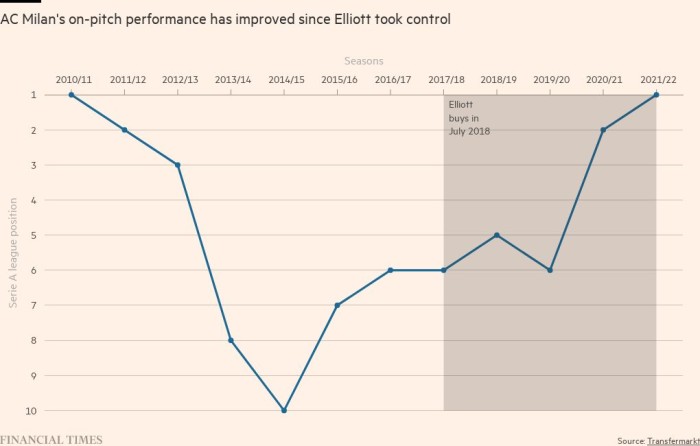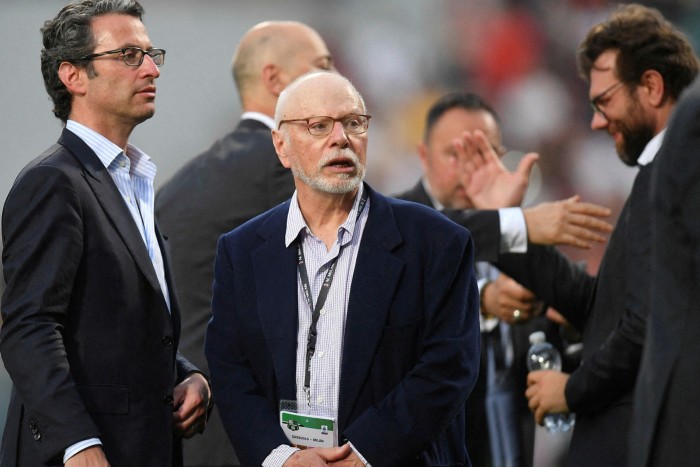Hours after landing in Milan on the last day of May, Gerry Cardinale sidestepped the press pack camped outside his hotel and headed to the home of an Italian football legend.
Cardinale, the founder of US investment group RedBird, had just sealed a €1.2bn deal to buy AC Milan from hedge fund Elliott Management but, before announcing it to the city’s football-mad public and media on June 1, the 54-year-old wanted to win over Paolo Maldini.
“It was very important to me that I did that,” Cardinale said of his lunch with Maldini, one of AC Milan’s most venerated captains and now the club’s technical director, who had recently accused Elliott of cutting him out of the sale negotiations. “We ended up spending three and a half hours together . . . it was fantastic.”
Surrounded by lemon trees and over a spread of prosciutto crudo and buffalo mozzarella washed down with Aperol spritz, Cardinale reassured Maldini that he remained central to the future of a club that just days earlier had been crowned champions of Italy for the first time since 2011.
Capping a whirlwind four weeks of negotiations for Cardinale, the meeting was also a gentle introduction to Italian football’s often fraught politics — one of the multiple challenges RedBird must now navigate to make its ownership a success.
While New York-based RedBird had long harboured ambitions to own an elite club, Elliott had until this year shown little appetite to sell the one that it took control of in 2018.
Renowned for a combative approach that saw it lock horns for more than a decade with the government of Argentina and publicly admonish companies from Twitter to Samsung, Elliott grew more receptive to a possible sale this year, according to a person familiar with the matter.
Elliott’s founder Paul Singer was uncomfortable owning such a high-profile business, the person added, irked at any suggestion AC Milan was simply a trophy asset and irritated at seeing employees in the stands at the club’s San Siro stadium.
As the Serie A season neared a climax with AC Milan closing in on the title, a race to find a new owner was gathering pace. Exclusive talks with Investcorp, the Bahraini-led asset manager, collapsed in May.
Cardinale wasted little time, flying to London on May 5 to meet Gordon Singer, who runs Elliott’s European operations and is the son of the founder. As RedBird set out how it would improve AC Milan’s cash flow, its original plan to buy the club via a private equity deal morphed into an more unconventional one in which Elliott is helping with the financing.
Elliott agreed to lend RedBird €600mn at a 7 per cent interest rate, a sum expected to fall to €200mn later this year as the firm raises money from existing investors and partners. The fund also secured warrants, financial instruments that Elliott could convert into an equity stake of between 1 and 2 per cent if the club were sold again or went public, according to people with direct knowledge of the matter.
“This enabled us to move on a dime, get a deal done, enable them to continue to participate in a way that they like to participate,” explained Cardinale, who established RedBird in 2014 after two decades as a banker at Goldman Sachs.
However, the sale process has drawn criticism from AC Milan board member Salvatore Cerchione, whose Blue Skye holding company owns just under 5 per cent of the club.
“Blue Skye has been unhappy over the opacity of the disposal process,” Cerchione said in a statement to the Financial Times. “We are confused about the real motives behind the disposal of the club, especially when such a bright future is ahead.”
Elliott declined to comment on Cerchione’s criticism.
These financial silver linings built into Elliott’s exit from AC Milan add an extra sheen to the returns it generated from a club it had never intended to own.
Even after injecting €750mn into the club, Elliott will turn a profit of roughly €450mn — excluding the interest payments coming from RedBird, according to people with direct knowledge of the matter. That works out to about a 15 per cent return per year, the people added.
Elliott’s ownership
Unlike RedBird, Elliott did not have aspirations to own a football club. A hard-nosed group relentless in unearthing opportunities to make money, Elliott spotted one in 2017 when little-known Chinese businessman Li Yonghong put forward an audacious bid to buy AC Milan from former Italian prime minister Silvio Berlusconi.
Led by Franck Tuil, then a senior portfolio manager at the fund, Elliott provided Li with €300mn of high-interest debt, securing itself an income stream and handing the Chinese entrepreneur control of one of football’s most decorated clubs. Li’s ownership proved brief, with Elliott seizing control when Li defaulted.

“We started off as financiers,” Giorgio Furlani, a portfolio manager at Elliott and AC Milan board member, recounted at the Financial Times’ Business of Football Summit in March. “Soon after, within a year, the club fell into a difficult financial situation; the owner was tapped out in terms of resources. So we had to come in, we took over ownership.”
Elliott took over a club in disarray — an inheritance made trickier by the scepticism that greeted the hedge fund’s installation as owners.
A serial winner of Europe’s top tournament in the 1990s and 2000s, AC Milan had not graced Uefa’s lucrative Champions League since 2014. The exile weighed on its revenues, which were flatlining at about €200mn and left San Siro, which it shares with arch-rival Inter Milan, in urgent need of modernisation.
“What we found when we took over was a totally disastrous situation: the club was bankrupt from a cash-flow perspective, too little earnings, too many costs,” Furlani recalled.
The efforts to turn the club round yielded little at first. In 2018, Ivan Gazidis, an acquaintance of Gordon Singer, was parachuted in from Arsenal as chief executive with a mission to repair the club’s finances and build new revenue streams. Maldini was instructed to cut the squad’s budget by ditching big earners and bringing in younger, cheaper players.
A Uefa ban in 2019 from European competition for historical breaches of financial fair play rules only darkened the mood. It proved a fertile backdrop for tensions, as Gazidis clashed with Maldini and Zvonimir Boban, then chief football officer, over whether to recruit expensive players.*

But the signing in late 2019 of Zlatan Ibrahimović, one of the finest centre-forwards of his generation, was a controversial exception and one that would be decisive in igniting a revival of the club’s fortunes on and off the pitch.
The now 40-year-old helped the club back into the Champions League at the end of the 2020/21 season, a much-needed boost for its finances. It also returned to Deloitte’s Football Money League, a widely watched ranking of clubs by revenues, after making €216mn that season.
Although Ibrahimović’s contribution kick-started the recovery that was sustained even amid the coronavirus pandemic, it was a youthful squad — including Rafael Leão, Theo Hernández and Sandro Tonali — that helped the club return to the summit of Italian football during Elliott’s final season in control.
Tu vuo fa l’Americano
Despite this triumph, Cardinale describes AC Milan as a “sleeping giant”. Closing the gap with well-funded rivals across Europe represents a significant challenge.
The Wall Street veteran is betting that his experience of working with some of America’s top-tier sports clubs, including baseball team the New York Yankees and American football’s Dallas Cowboys, and athletes such as Alex Rodriguez and basketball player LeBron James, has forged a playbook that can take AC Milan to new heights.
A new stadium heads a to-do list for RedBird that includes striking a media rights package for all of Serie A as well as enlisting celebrities and fashion brands to inject some glamour into the AC Milan brand.
“A brand of this scale, like AC Milan, should have infrastructure that is indicative of its football prowess and global potential,” said Cardinale. “We’ve had a lot of experience with stadium projects in the US. Milan and Italy deserve a world-class stadium that houses the best of sports and entertainment on a global scale.”
Cardinale appears undaunted by the riches accumulated by the English Premier League, which has capitalised on the competition’s global appeal through a series of lucrative media deals. According to Deloitte, England’s top 20 clubs generated revenues of €5.1bn in the 2019-20 season, some €3bn more than Serie A. Just a decade earlier, that gap was roughly €1bn.
“There’s a huge opportunity at the macro level with Serie A,” argued Cardinale. “There should not be this kind of revenue differential on the media side between Serie A and the English Premier League.”
Leveraging Milan’s status as a global fashion capital — Armani, Versace and Prada are among the brands that call the city home — is also part of RedBird’s multipronged strategy to build AC Milan as a business.
The stakes are high for RedBird. Although its investments span YES, the Yankees’s regional sports network, and Fenway Sports Group, the owner of Liverpool FC and the Boston Red Sox, AC Milan is by far its highest-profile deal.
The recent record of other wealthy Americans seduced both by Italian football’s rich heritage and future potential is not encouraging. Boston-based hedge fund tycoon James Pallotta’s plan to build a 52,500-seat stadium for AS Roma was thwarted by politics in 2014 and he has since sold the club.
RedBird’s hopes to build a new stadium — along with its other ambitions — ultimately depend on AC Milan sustaining its renaissance on the pitch.
Cardinale’s introduction to Maldini was made by Maverick Carter, boss of SpringHill Company, a media and entertainment business that counts RedBird as a shareholder.
“I connected him with Paolo because I knew how important and valuable that partnership [would be],” said Carter. Renewing Maldini’s contract, which expires at the end of the month, is at the top of Cardinale’s in-tray.
*This article has been amended to clarify Zvonimir Boban’s role at AC Milan
Credit: Source link














